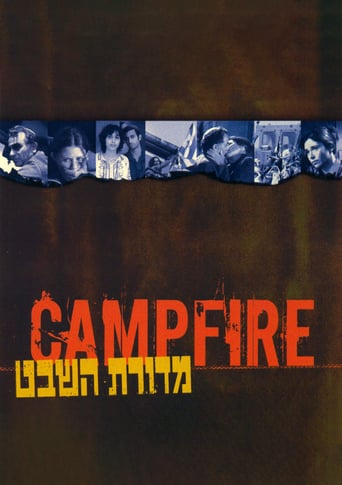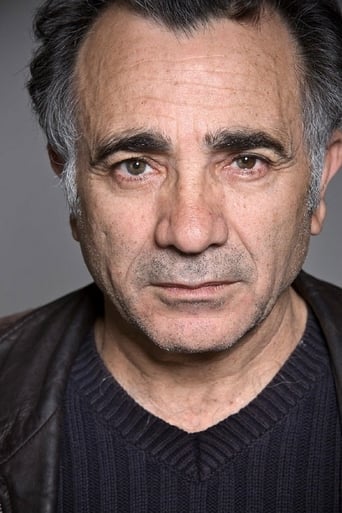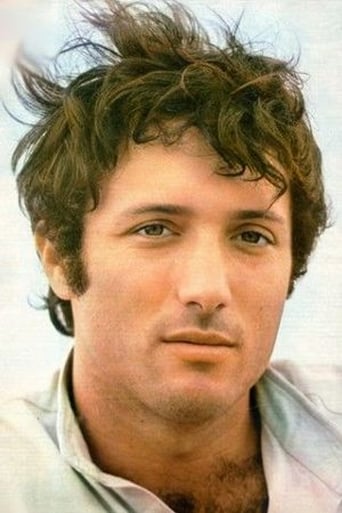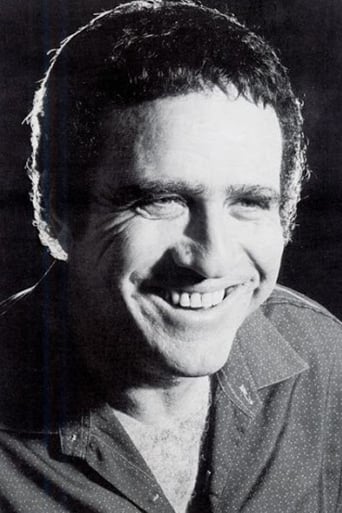

Campfire (2004)
The story of one woman's personal battle for acceptance, but also a portrait of a political movement that has forever affected millions of lives in the Middle East.
Watch Trailer
Cast


Reviews
How sad is this?
As Good As It Gets
It's funny watching the elements come together in this complicated scam. On one hand, the set-up isn't quite as complex as it seems, but there's an easy sense of fun in every exchange.
I wanted to like it more than I actually did... But much of the humor totally escaped me and I walked out only mildly impressed.
Rafi hangs out with the bad boys. Even though Tami Gerlick(Hani Furstenberg) is accompanied by her mother and older sister, the boys still badger the schoolgirl about her reputation. "Is it true you put out?" challenges the ringleader, in a leering singsong voice that Tami mistakes as flattery. On some level, she likes the attention; she feels safe, in spite of the sexual innuendo-laced taunting, because Rafi is with them, her protector. Rachel(Michaela Eschet) confronts the boy for disrespecting her little gosling, but the admonitory words do nothing to deter his predatory stance. Everybody knows that the mother has been widowed for over a year. Without any man to protect this family of women, he knows that Tami Gerlick is fair game. He also knows that the Zionist elders will excuse any prospective transgressions, as "Medurat Hashevet" tells the story of a mother's struggle to raise her daughters under a patriarchal construct. Once the littlest Gerlick decides to brave the hinterlands of secularity at an outdoor religious function, the outcome results in the wavering of Rachel's blind faith towards her Zionism, since Motkeh(Assi Dayan), the monolithic leader of a settlers' movement, tells the single parent candidate to remain silent, after Rafi, the disappointing knight in shining armor, acts like a mere boy for Tami in her time of need. Disillusioned, and resigned to accepting her sex's place in the designs of officious men, Rachel surrenders the settlement plans she had for the West Bank, in order to join her daughter in those same hinterlands, where she can watch over Tami, and the other daughter, the older and rebellious Esti(Maya Maron), with the help of a new boyfriend, the fifty-something-year-old virgin, Yossi(Moshe Ivgy).Tired with the campfire songs of her youth group at the official bonfire, Tami suggests to a friend that they join the other fire-starters across the woods: Rafi's hoodlum friends, who had boldly objectified her despite the presence of an attending parent. Prior to this momentous decision, the filmmaker shows us Tami's inquiring mind at work(groundwork for the girl's culpability during her attack), in a scene where the girl positions herself towards a separating wall to get an earful of the extracurricular activities in Esti's room. Tami is made more worldly than your average Israeli girl, in due part to the filmmaker's American sensibility, best exemplified when the girl puts on a record and starts to dance around the empty apartment, a scene which seems lifted out of a Hollywood chick flick. As she sings to her reflection, all that's missing is the hairbrush. The lewd campfire song that sung by Rafi and his friends gives Tami's fledgling female camper pause, but not the precocious adolescent, who's not shy about telling a bawdy joke(like Minnie Driver in Gus Van Sant's "Good Will Hunting") around the alternate campfire. As she gets to the part of her story which involves the first base of erogenous zones, the camera conspires with Tami's attackers by suppling them an alibi, as the camera tilts down to a corresponding breast while she narrates; it's a prompting with an undertone of inevitability, the prelude to a rape, including a grope session before the filmmaker omits the gross breach in amity by an aggregate of restraining hands and cruel torsos. That subtle tilt of the camera suggests a girl who turned her attacker(s) on: a girl who was asking for it. For some viewers, the act of dramatized rape works as a base fetish, so the decision to keep the rape off-screen seems like a respectful one. But by keeping the rape a secret from the viewer(as Tami keeps it a secret from her mother and sister), her continuing adoration of Rafi is made possible. After all, he allowed it to happen, like one of those bar patrons in Jonathan Kaplan's "The Accused". Adding insult to injury, the boys spray-painted her misdeed in stone all over the Zionist jurisdiction of the town. And Rafi let the lie remain there without any gesture towards concealing the affronting words with paint(as Rachel and Esti do). Instead of the cowardly boy making amends with the debased girl, "Medurat Hashevet" shows us the harmful effects of a governing patriarchal mindset when Tami seeks out Rafi, asking him for forgiveness, and expressing surprise in his ongoing interest for her. Tami feels like she's damaged goods. Does the filmmaker feel the same way, too? In other words, is the film critical of God, or the girl? Since Rachel breaks away from her faith, "Medurat Hashevet" has the outward appearance of having contemporary ideas about women, but the handling of Tami's rape seems like a compromise, in which Zionism isn't thrown under a bus and completely trampled by feminism.
Joseph Cedar's wonderful "Campfire" affirms what one had already known: the quality of Israeli films. As he demonstrates with this heart wrenching tale that involves a recently widowed woman, at a crucial moment of her life, "Campfire" shows a director that is in touch with the situation he is presenting us.The Gerlick household is not the most pleasant place to be. Rachel, the mother, has lost her husband about a year ago. Esti, the oldest of the two daughters, is having an affair with a young soldier. Tami, the youngest girl, who is at the center of the story, is clearly lost and not being able to cope, or make sense of all what's happening around her.Rachel is fixed by a friend on a blind date with the shy Yossi, a middle aged man who is the owner of a bus. Their first date at a Chinese restaurant is pleasant, but we don't see sparks fly between them. Yossi is a lonely man who has gone on a lot of similar dates, never ending with a woman of his own, much less a wife.Tami, the youngest daughter is awakening to sexuality. She is a shy girl who has never done anything wrong and suddenly finds herself at the center of attention from the teen age boys who are up to no good and want to have fun at her expense. At the campfire, a group of boys taunt Tami into doing things she is not prepared for and she is horrified when horrible things are written on the walls of her house deeming her a common prostitute, when in reality nothing has happened.Rachel finally gets enough courage to confront the leaders of the new development where she would like to relocate with the girls because she realize that she is not wanted and it's the children of some of these people who are responsible for the cruelty toward Tami. After calling Yossi for help on a few occasions, it's clear that he has fallen for Rachel and is accepted by the girls.The film is bitter sweet with great appearances by the four principals. Michaela Eshet is wonderful as Rachel. Moishe Ivgy has such a noble face, that just one look at him, one realizes this is a decent man who will make anyone happy because he has a lot to give after not having known love in his life. Young Hani Furstenberg is also appealing as Tami and Maya Maron, who was excellent in "Broken Wings" plays the older Esti.Congratulations to Joseph Cedar and his team for a wonderful, heart-felt film about real people in a real situation.
I think people either love or hate this movie, and their politics will have an influence, of course.The movie shows the less than pretty side of the settler movement and the national religious wing -- the sexism, the hostility toward anyone that doesn't fit the exact mold (even if they support the movement politically), the racism.The heroine who thinks that going off to a settlement in the occupied territories is - surprise, surprise! - shocked to discover that as a woman without a man, getting accepted will be an uphill struggle (they tell her straight out they need men for not only defense, but prayer quorums, as women don't count there). The near rape of the younger daughter is by nationalistic religious boys who are on the outskirts of their own movement because of their dark skin (the very fundamentalist Shas movement is the result of this discrimination within the religious community, but that's another story).Of course the religious/settlement people will hate this movie. The people responsible for sending it out of the country will probably be called traitors (and I wouldn't be surprised if there are death threats) for showing the warty side of the settlers among themselves, never mind towards the Palestinians.Gaon is sure a hoot in his role -- by the way, in real life he is rather center left.
The first question that popped in my head once the ending credits appeared, was- should I be offended?This movie, after all, deals with religious-Zionists and I am a movie-buff secular so maybe the depiction of this much maligned (for no justifiable reason, in my humble opinion) sector was credible and not a slanderous attack. I believe I have reached a conclusion.Today, when a new rift in Israel is emerging over the implementation of the disengagement program lead by prime minister, Ariel Sharon, it's easy to relate to the 1981 struggle against the evacuation of the Sinai peninsula after the signing of the historical peace accord with Egypt.1981 found Tammy Gerlik (Hani Furstenberg in a wonderful performance) in a Jerusalemite neighborhood with her older sister and widowed mom who decides to move to a new settlement in the occupied territories with her circle of the religious, patriotic and unified but also hypocrite and mistrusting circle of friends. It also finds Tammy in her teenage years when romantic feelings and self-defining questioning begin to emerge. Her generally cheerful personality suffers a major setback when Tammy is nearly raped by a violent teenager with the cheering of his dubious "buddies". With a mother too self-absorbed, and "friends" that tag her as a promiscuous girl, she finds a soul mate in her rebellious sister that is alienated to her mother for abolishing her chance of privacy in a very boisterously funny scene that involves a hammer (can't elaborate, sorry).In the meantime, the mother, Rachel (Micaela Eshet, in a reasonably good but not much more, performance), is a 42 year old strong woman who had married too early and went through life without falling in love. While shunning as delicately as possible the courting of a highly renowned and severely boring, cantor, she forms a friendship with, Yossi, a bachelor bus driver/ultimate loser who has lost hope of ever conjugating (let alone, wed) an actual woman.With Yossi as a refuge from the pretense of a strong willed woman, Rachel realizes the true nature of her friends, the frailty of their loyalty and worst of all, their obsession of sweeping unflattering phenomena under the carpet, even at the grave price of perpetuating it for posterity. The movie is well acted, credibly written and even manages to give the audience the atmosphere of the early 80's when Israelis had one TV channel to watch, one telephone company and a strong sense of patriotism that is disparaged and demonetized by too many these days.Which brings me to my question in the beginning of this review, should I, the secular guy (who identifies with Yossi the bus driver more than he wishes), should be offended when the religious society is presented in a very critical manner.The answer to that question is simple: when you are offended on behalf of a grown up group for being disparaged, you might be disparaging it yourself by deciding for them how they should feel.I feel, personally, that the director, Yosef Cedar (who grew up in a religious background but is pretty estranged to it, according to his own testimony) decided to "indict" his origins. As a result, the viewer is deprived from an unbiased impression of one of the most enigmatic, controversial and riveting sector in contemporary Israeli society.The movie won as best film in the Israeli Oscar competition and its victory was outshone by the fact that the movie "sof haolam smola" which was one of the most popular films in Israeli history, wasn't even nominated in any of the major categories.Unfair representation of "Sof haolam smola" in the Israeli Oscar robbed the movie of the buzz it could have generated. Also, the film's unfair representation of a certain sector in the Israeli society left me questioning its antagonism, rather than enjoy its undeniable qualities. Qualities it hones in abundance.8.5 out of 10 in my FilmOmeter.




